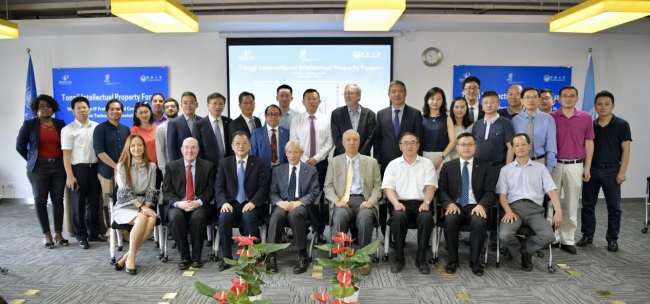

On August 1, 2018, under the guidance of the World Intellectual Property Organization (WIPO) and the State Intellectual Property Office of China, the workshopon “IPProtection and Competition in New Technology Revolution” of Tongji Intellectual Property Forum was successfully held by Shanghai International College of Intellectual Property (SICIP) of Tongji University. Distinguished guests attended the workshop, including Joe Bradley, head of Education Program ofWIPO, Chen Hongbing, director of China Office of WIPO, Tian Lipu, president of China Intellectual Property Research Association, former director of State Intellectual Property Office, Zhang Bin, vice president of Shanghai High People's Court, and Lei Xinghui, vice president of Tongji University, and respectively delivered a speech. More than 40 Experts and scholars from domestic and foreign academic institutions and governmental and judicial departments such as Max Planck Institute for Innovation and Competition, University of Namur of Belgium, Texas A&M University, Chinese Academy of Social Sciences, Shanghai Jiaotong University, Shanghai Intellectual Property Court and professors and students from SICIP and other departmentsof Tongji University attended the workshop.

Lei Xinghui, vice president of Tongji University, said that SICIP is committed to building a world-class intellectual property talent training platform. It is hoped that through the in-depth exchanges between Chinese and foreign scholars and experts, the relevant legal and management issues caused by technological innovations such as artificial intelligence, clean energy and big data will be explored. Joe Bradley fully affirmed the operation of WIPO-Tongji University master program of IP lawby SICIP and confirmed that the WIPOInstitute will further strengthen cooperation with SICIP. Chen Hongbing believes that under the background of the new technological revolution, through the joint efforts of the government, academic, business, and judicial parties, such as SICIP coordinates, the international dialogue capability of China's intellectual property rights will continue to be strengthened. Zhang Bin pointed out that the Shanghai High People's Court, as the national pioneer in judicial reform, has always been committed to exchanges with countries with rich experience in international organizations cooperation and intellectual property protection, and has established close cooperative relations withSICIP. In the future, Shanghai High People’s Court and SICIPwill continuously and jointly strengthen the combination of intellectual property law education and judicial practices. Tian Lipu stressed that the new technological revolution has brought enormous challenges to the current intellectual property system. He believes this workshopwill provide valuable suggestions for the development and reform of the global intellectual property system.
Professor Robert Queck presided over the first session of the seminar "In Respect of New Technological Issues and Intellectual Property." Prof. Joseph Straus, former director of the Max Planck Institute for Innovation and Competition (formerly MPI for Intellectual Property, Competition and Tax Law), gave a report entitled “Artificial Intelligence: Technical, Economic and Patent Law Aspects”, analyzing the impact of artificial intelligence on economic development and the challenge of the traditional patents object. Professor Li Mingde from the Chinese Academy of Social Sciences conducted an in-depth analysis of the issue of "Human Being, Author and Work" from the perspective of copyright law. “ Professor Irene Calboli of Texas A&M University gave a speech on “Intellectual Property and Green Technologies and Impact on Climate Change”. She believes that climate change should strengthen the transformation of new green technologies and keep them in harmony with environmental changes and economic growth.
Professor Zhu Xuezhong from Shanghai International College of Intellectual Property of Tongji University presided over the second sessionof theworkshop, “In Respect of Cross Cutting Issues Related to IP”. Professor Hou Liyang from Kaiyuan Law School of Shanghai Jiaotong University made a speech entitled “The War on Standard Essential Patents within the Chinese Anti-monopoly Context”. He believes that by setting a unified standard essentialpatent negotiation standard, it can prevent the right holders from implementing anti-competitive practices. Associate Professor Yu Xinmiao from SICIPof Tongji University discussed the topic of “Big Data and Competition Restriction”. He proposed that the current monopolistic behavior of market entities using big data is not conducive to market competition and industry development, and Anti-Monopoly Law Enforcements should strengthen regulation of various monopolistic behaviors in the Internet sector. Associate Professor Cheng Deli from SICIPinhis research about the “Patent Surge and Quality: a Comparative Study of China and USA”, discussed the issue of the motivation of Chinese patent surge, whether the surge of patents led to the decline of patent quality, and the comparison of patent quality assessment methods between China and developed countries. Associate Professor Xu Ming from SICIPpointed out in the report “Code as the Law: The Impact of Blockchain Technology on Patent System” that the blockchain technology has the characteristics of decentralization and non-tampering, and can be applied in the patent system to reduce the error caused by human factors.
Professor Liu Xiaohai from SICIPpresided over the final session of the workshop“In Respect of Enforcement of IPProtection”. Judge Xu Fei of the Shanghai Intellectual Property Court introduced the "Main Issues in Adjudicating Cases of Copyright Infringement through Network". Through case analysis, she said that it is necessary to promote and further clarify the "safe harbor" rules of the Copyright Lawand improve them. Dr. Arthur Wolff from Baier Law Firm expressed in his speech on "New Technologies and Dispute Resolution: The Resolution of Technology (IP) Disputes - The Role of WIPO", that the use of WIPO arbitration rules and arbitration mechanisms to resolve technical disputes should become a preferred solution for the international subjects to resolve a technology transfer contract dispute.

The workshopfocused on the frontier issues of intellectual property and competition in the context of the new technological revolution. It brought together the views of IP experts in different fields and provided effective suggestions on the interaction and coordination of intellectual property rights, competition policies and new technologies. Distinguished guests and participants had heated and far-reaching discussion, and the workshopreceived the expected results.






 0086-021-65983113
0086-021-65983113  sicip_intoff@tongji.edu.cn
sicip_intoff@tongji.edu.cn